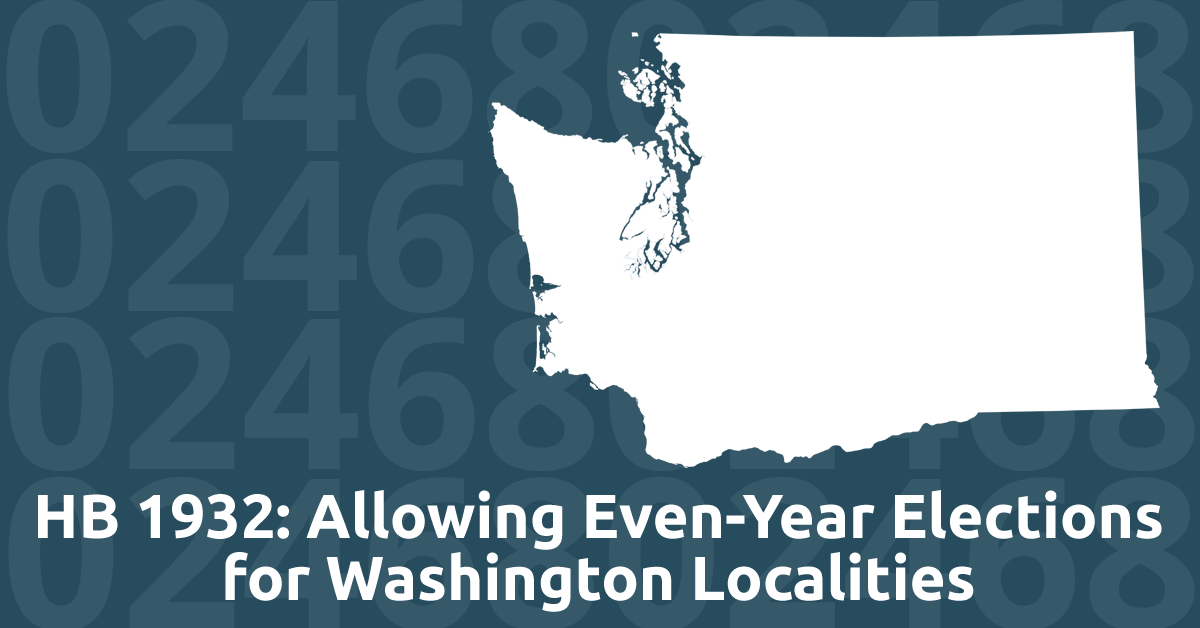NPI’s priority legislation to give cities and towns the freedom to switch their elections to even years has cleared another key hurdle in the legislative process.
Today, a majority of the Senate State Government & Elections Committee voted to give HB 1932, prime sponsored by State Representative Mia Gregerson, a “do pass” recommendation, sending it on to the Senate Rules Committee, where its sibling, Senate Bill 5723, has been hibernating for more than a year.
HB 1932 would change an old state law dating back to the 1960s that requires municipalities to hold their regularly scheduled elections in odd-numbered years. Under our legislation, they would gain the freedom to switch to even years if they wanted, but they wouldn’t be required to change their timing.
HB 1932 was voted out of the Washington State House of Representatives earlier this month and was heard in the Senate last Friday. It needed to get a “do pass” recommendation at today’s committee meeting to remain active, because tomorrow is the cutoff for opposite chamber policy bills.
Due to the brevity of the 2024 legislative session, committees only had a few days to hear and report out bills from the opposite chamber.
The Senate State Government & Elections Committee had to schedule an extra committee meeting last Thursday evening just to accommodate all of the House bills pertaining to its area of focus that it wanted to consider. Today, its list of bills slated for action in executive session totaled twenty-one, including HB 1932.
Most of the list of twenty-one bills were voted out efficiently, but not HB 1932. Republicans, evidently hoping to sink the legislation, engaged in a time-wasting exercise of trying amend it almost a dozen different ways, forcing the Democratic majority to rhythmically mow down their amendments.
One of those amendments, offered by Jeff Wilson, tried to resurrect Tim Eyman’s now dead push polls, which this organization and Senator Patty Kuderer (who took point in responding to the Republicans’ proposals) were responsible for abolishing last year in tandem with State Representative Amy Walen.
Another amendment, offered by Phil Fortunato, oddly tried to exclude the 31st Legislative District (which Fortunato represents) from the legislation.
Additional amendments were sourced from the House Republican caucus, which proposed a slew of changes to HB 1932 when it was on the House floor.
The Democratic majority took only one amendment, from Kuderer, which modified the scope of the bill to make it resemble Senate Bill 5723, the legislation the committee considered last year. The bill now only pertains to cities and towns — school districts, ports, and other levels of local government are no longer included in the bill and would not gain the freedom to choose their own election timing.
Additionally, Senator Kuderer’s amendment specifies that cities and towns wishing to switch must do so through a vote of both their governing body and a vote of the people, rather than just one or the other. Like SB 5723, the bill still allows cities and towns anywhere in Washington to switch to even years.
The vote to send HB 1932 on up to Rules was 4–3:
Voting for a “do pass” recommendation: Democratic Senators Sam Hunt, Patty Kuderer, Javier Valdez, and Bob Hasegawa
Voting for a “do not pass” recommendation: Republican Senators Jeff Wilson, Phil Fortunato, and Perry Dozier
If HB 1932 gets pulled from Rules, selected for floor action, and passed either in its current form or with further changes, it would then return to the House of Representatives. The House could choose to concur in the Senate’s amendments, or it could ask the Senate to recede from its amendments.
In the event that the Senate chose to recede from its amendments, the bill would revert to its prior incarnation. If the House voted to accept the Senate amendments, the bill would go to Governor Inslee. Otherwise, the bill would go to conference, allowing the two chambers to negotiate a final compromise version.
NPI thanks Senators Hunt, Kuderer, Valdez, and Hasegawa for prioritizing this important, much-needed legislation. Their vote today gives this bill a chance to be considered by the full Washington State Senate between now and March 1st.
Follow this link to urge your state senator to support HB 1932.

